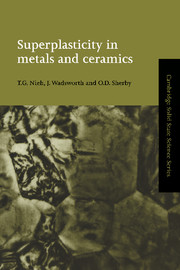Book contents
- Frontmatter
- Contents
- Preface
- Chapter 1 Introduction
- Chapter 2 Key historical contributions
- Chapter 3 Types of superplasticity
- Chapter 4 Mechanisms of high-temperature deformation and phenomenological relations for fine-structure superplasticity
- Chapter 5 Fine-structure superplastic metals
- Chapter 6 Fine-structure superplastic ceramics
- Chapter 7 Fine-structure superplastic intermetallics
- Chapter 8 Fine-structure superplastic composites and laminates
- Chapter 9 High-strain-rate superplasticity
- Chapter 10 Ductility and fracture in superplastic materials
- Chapter 11 Internal-stress superplasticity (ISS)
- Chapter 12 Other possible superplasticity mechanisms
- Chapter 13 Enhanced powder consolidation through superplastic flow
- Chapter 14 Superplastic forming and diffusion bonding
- Chapter 15 Commercial examples of superplastic products
- Index
Chapter 5 - Fine-structure superplastic metals
Published online by Cambridge University Press: 15 October 2009
- Frontmatter
- Contents
- Preface
- Chapter 1 Introduction
- Chapter 2 Key historical contributions
- Chapter 3 Types of superplasticity
- Chapter 4 Mechanisms of high-temperature deformation and phenomenological relations for fine-structure superplasticity
- Chapter 5 Fine-structure superplastic metals
- Chapter 6 Fine-structure superplastic ceramics
- Chapter 7 Fine-structure superplastic intermetallics
- Chapter 8 Fine-structure superplastic composites and laminates
- Chapter 9 High-strain-rate superplasticity
- Chapter 10 Ductility and fracture in superplastic materials
- Chapter 11 Internal-stress superplasticity (ISS)
- Chapter 12 Other possible superplasticity mechanisms
- Chapter 13 Enhanced powder consolidation through superplastic flow
- Chapter 14 Superplastic forming and diffusion bonding
- Chapter 15 Commercial examples of superplastic products
- Index
Summary
Most superplastic metal alloys exhibit large tensile elongations of about 500% to over 1000%. For the most advanced structures, however, the forming strains are typically less than 200 to 300%. Thus, these elongation values are sufficient to make extremely complex shapes using superplastic forming technology. In so doing, large cost and weight savings (through redesign) have provided the driving force for the change from conventional forming to superplastic forming technology. The principal, fine-structured alloy systems that have been commercially exploited for superplastic forming are those based on aluminum, magnesium, iron, titanium, and nickel alloys. Other alloy systems, e.g., Zn–Al, Cu–Al, and Pb–Sn, have also been widely explored. The study of these alloys, however, is usually for achieving basic understanding rather than for structural applications. Many reviews already exist to cover these alloys, so in the following sections, we will only discuss those that are important for structural applications.
Aluminum-based alloys
It is instructive to review the evolution of superplastic aluminum alloys to gain a basic understanding of how a structural alloy group is developed. For this purpose, an overview of the development of superplastic aluminum alloys from 1966 to 1984 is presented in Figure 5.1, where each box represents an individual publication. The description within each of the boxes refers to the nominal alloy composition (in wt%) or to the commercial designation, if appropriate.
- Type
- Chapter
- Information
- Superplasticity in Metals and Ceramics , pp. 58 - 90Publisher: Cambridge University PressPrint publication year: 1997
- 6
- Cited by

